10 Essential Car Saving Tips for Drivers
You can greatly cut car expenses by adopting ten essential tips. Start by optimizing your driving habits—smooth acceleration and maintaining a steady speed save fuel. Prioritize vehicle maintenance with regular oil changes and tire inflation checks. Clear out excess weight and plan efficient routes to avoid congestion. Use technology like GPS and fuel tracking apps to enhance your driving experience. Additionally, be mindful of your climate controls to minimize air conditioning usage. These simple changes can lead to substantial savings and better fuel efficiency. Keep going to uncover even more practical tips that can help you save!
Key Takeaways
- Optimize driving habits by maintaining a steady speed and using smooth acceleration to improve fuel economy by up to 30%.
- Prioritize regular vehicle maintenance, including oil changes and air filter checks, to enhance mileage and engine efficiency.
- Keep tires properly inflated, as maintaining the recommended pressure can boost fuel efficiency by 1-3%.
- Reduce excess weight in your vehicle, as each 100 lbs removed can improve fuel efficiency by 1-2%.
- Plan efficient routes using GPS to avoid traffic and minimize stops, enhancing overall fuel economy.
Optimize Driving Habits
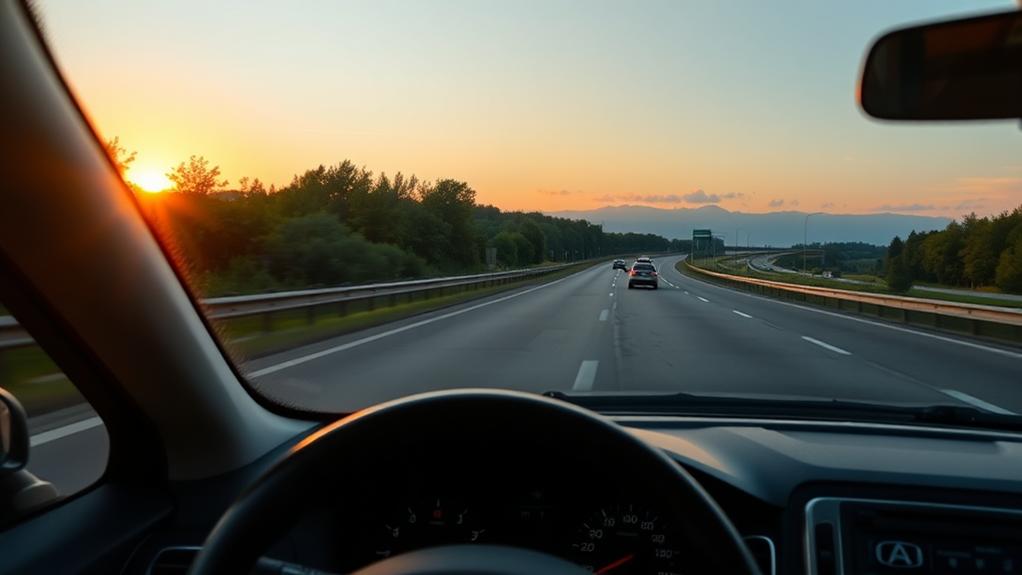
When it comes to optimizing your driving habits, small changes can lead to significant savings at the pump. By focusing on how you drive, you can increase fuel efficiency and enjoy a more liberating experience behind the wheel. Start by practicing smooth acceleration and braking; gentle starts and stops can improve your fuel economy by up to 30%. This means you can glide through traffic without wasting precious fuel.
Maintaining a steady speed is equally essential. When you keep your speed between 50-60 mph, you maximize fuel efficiency, as fuel consumption rises with every mph over this range. Using cruise control on the highway helps you maintain that steady pace, reducing fuel usage by as much as 20%.
Anticipate traffic conditions and keep a safe following distance. This prevents unnecessary braking and acceleration, which can sap your fuel reserves. Instead of hitting the brakes, try coasting to decelerate. This technique conserves momentum and promotes smoother driving overall. By adopting these simple driving habits, you'll not only save money but also enhance your sense of freedom on the road.
Prioritize Vehicle Maintenance
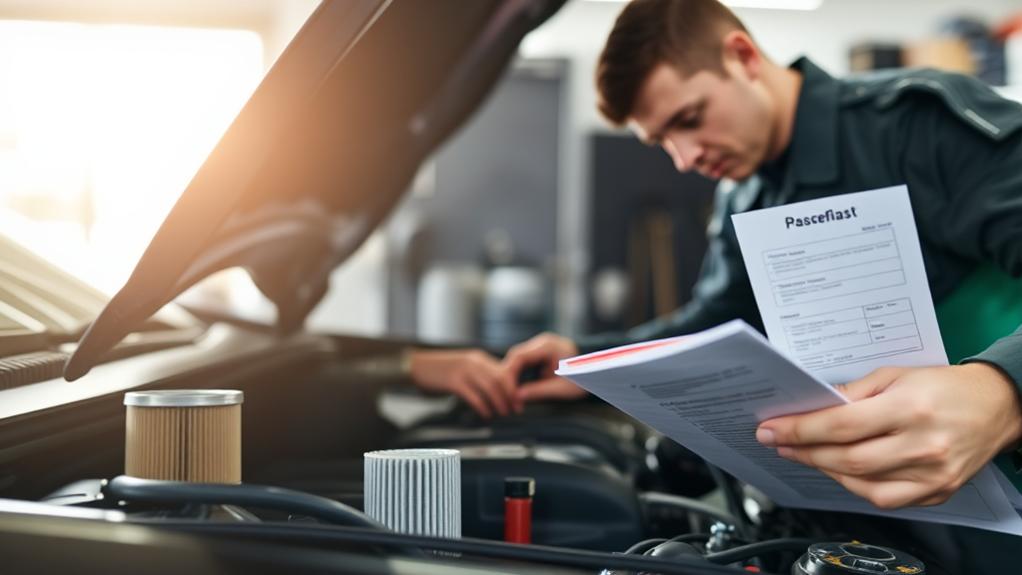
Prioritizing vehicle maintenance is crucial for keeping your car running smoothly and efficiently. By staying on top of regular maintenance, you'll not only extend the life of your vehicle but also boost your fuel economy. Start with regular engine tune-ups; these can enhance your mileage by an average of 1 mpg, ensuring your car performs at its best.
Next, regularly check your tire pressure. Proper tire inflation can prevent a loss of up to 1 mpg, which helps you save on fuel costs. Don't overlook air filters, either; routine checks and replacements can greatly improve engine efficiency, contributing to better fuel economy.
Keeping your fuel system clean is another essential step. A clean system optimizes combustion and positively impacts fuel usage. Finally, consistent oil changes lead to smoother engine performance, further improving your mileage and reducing fuel costs.
Manage Weight Effectively
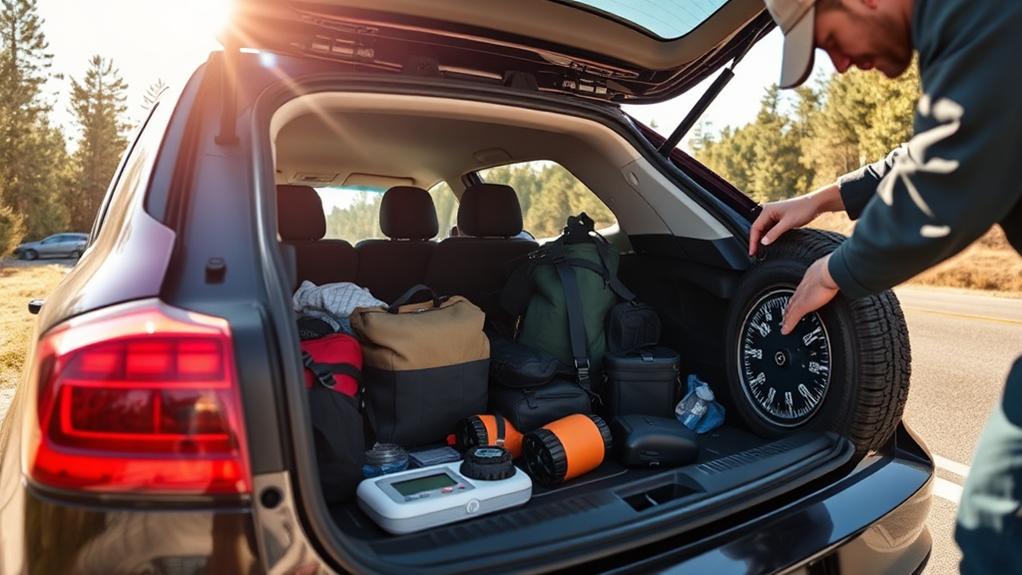
Regular vehicle maintenance sets the stage for efficient driving, but managing weight effectively is just as important for maximizing fuel economy. By reducing excess weight, you can enhance your vehicle's fuel efficiency by about 1-2% for every 100 lbs removed. This might not seem like much at first, but over time, those savings really add up.
Start by keeping your trunk clear of unnecessary items. Not only does this maximize fuel usage, but it also improves your car's handling and acceleration. If you've got a roof rack or carrier that's not in use, take it off! Doing so can save you up to 10% on fuel costs by cutting down on aerodynamic drag.
Additionally, distribute weight evenly within the vehicle. This practice prevents strain on the engine and boosts overall performance. Regularly assess your car and declutter it to maintain maximum fuel efficiency. Every little bit helps, and making these changes can prolong your vehicle's lifespan while giving you the freedom to enjoy the open road without breaking the bank.
Use Recommended Fuel Type
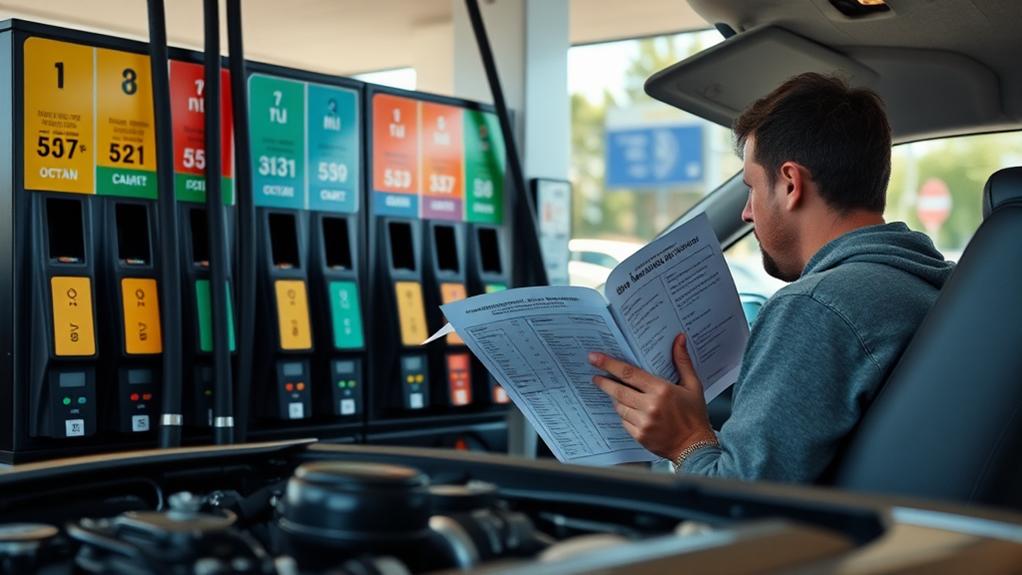
Choosing the right fuel for your vehicle is vital for achieving ideal performance and fuel efficiency. Using the recommended fuel grade maximizes your vehicle's fuel economy, since opting for higher-octane fuel typically won't provide significant performance benefits for most cars. To verify you're using the best fuel for your specific make and model, check your owner's manual. This simple step can help you avoid unnecessary costs and keep your engine running smoothly.
Understanding local fuel options is also important. For instance, some ethanol blends can reduce fuel economy and impact engine performance negatively. Make it a habit to monitor the quality of fuel at the pump, as poor quality can lead to engine issues and diminish your overall fuel efficiency over time.
While you might come across fuel additives claiming to enhance mileage, be cautious. Some can actually cause complications rather than benefits. Stick to the recommended fuel type and avoid these risky additives to maintain freedom on the road without costly interruptions. By being mindful of your fuel choices, you can make certain your vehicle runs efficiently and save money in the long run.
Plan Efficient Routes
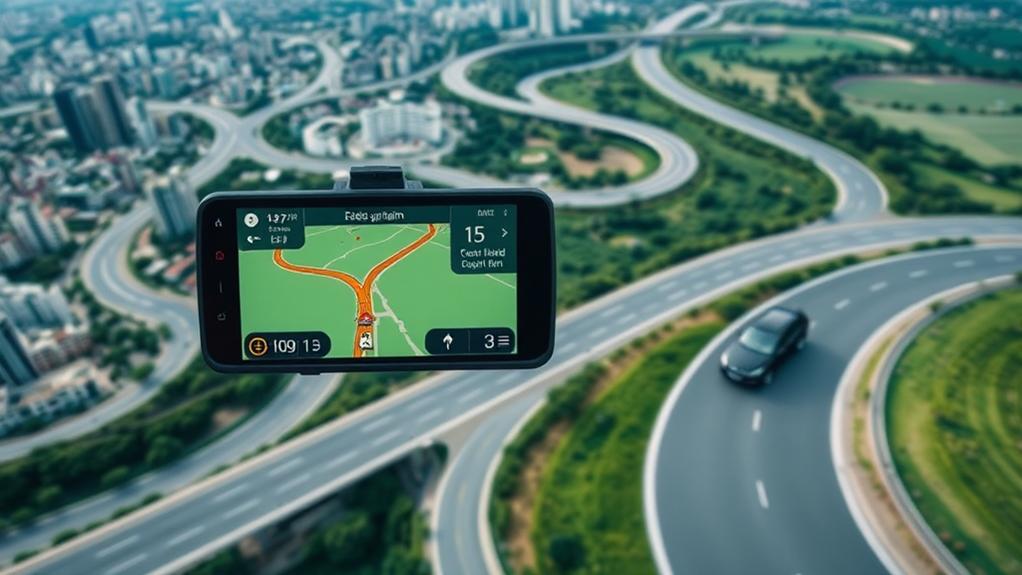
Planning efficient routes can make a considerable difference in your fuel consumption and overall driving experience. By utilizing GPS for real-time traffic updates, you can easily avoid congested areas and decrease fuel waste caused by idling and stop-and-go driving.
Combining errands into one trip not only saves you time, but it also helps improve fuel economy; a warm engine operates more efficiently than a cold one. When planning your trips, aim for shorter routes that minimize frequent stops, as continuous driving conserves fuel much better than maneuvering through traffic lights and stop signs.
Consider traveling during off-peak hours to reduce your time spent in traffic. This simple adjustment can greatly save fuel and enhance your mileage. Understanding local traffic patterns and peak congestion times allows you to plan trips more effectively, resulting in lower fuel costs.
Incorporating these strategies into your driving routine can help you save fuel, improve your vehicle's efficiency, and give you the freedom to enjoy the open road without the worry of unnecessary fuel expenses. By taking control of your route planning, you'll not only help your wallet but also contribute positively to the environment.
Control Climate Wisely

Controlling your vehicle's climate wisely can play a significant role in saving fuel and enhancing your overall driving experience. One of the biggest culprits of decreased fuel economy is Air Conditioning, which can lower your mileage by as much as 2 mpg. To mitigate this, use it sparingly, especially at lower speeds. Instead, consider utilizing your vehicle's ventilation system, which can effectively cool your cabin without burning extra fuel.
Parking in shaded areas is another smart move. It reduces the need for air conditioning when you first get in, helping you conserve fuel right from the start. Additionally, keeping your windows closed when driving at high speeds minimizes aerodynamic drag, which can greatly enhance fuel efficiency compared to having them open.
Maintain Tire Pressure
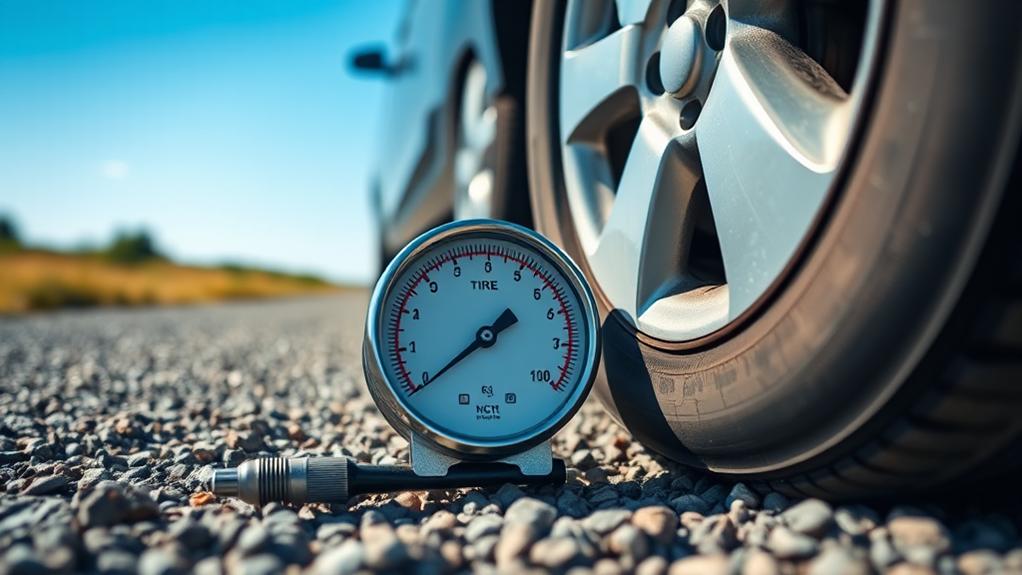
Keeping your vehicle's climate in check is just one part of guaranteeing efficiency on the road; maintaining proper tire pressure is equally important. By regularly checking your tire pressure, you can increase fuel efficiency by 1-3%. This simple action not only enhances your vehicle's performance but also helps save on fuel costs. Under-inflated tires create more rolling resistance, leading to a significant drop in fuel economy—up to 1 mpg lost for every tire that's not properly inflated.
To maintain ideal tire pressure, always refer to the manufacturer's recommendations, typically found on the driver's side door jamb or in your owner's manual. Keeping your tires inflated to the right level not only boosts fuel efficiency but also guarantees safer handling and extends the life of your tires by preventing uneven wear.
Incorporating a quick routine of checking your tire pressure can lead to substantial savings over time. So, before you hit the road, take a moment to give your tires some love. It's a small effort that pays off big, letting you enjoy the freedom of the open road without breaking the bank.
Adapt to Driving Environment
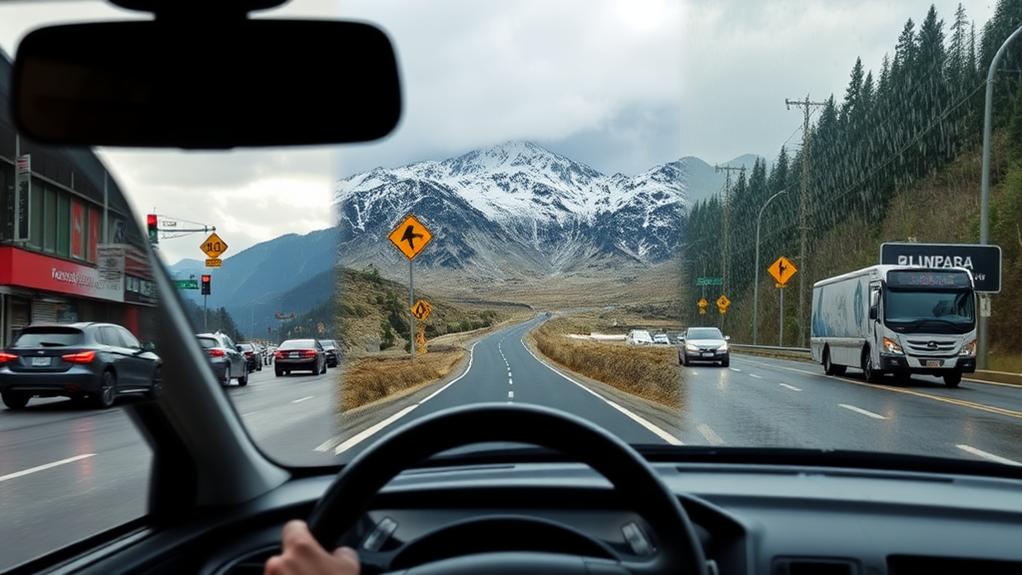
Adapting to your driving environment can greatly boost your vehicle's fuel efficiency. When you choose routes on flat terrain rather than hilly ones, you'll typically find better mileage. Ascending hills requires more power, which can sap your fuel quicker than you might think. Pay attention to weather conditions too; avoiding heavy rain and strong winds can help you maintain a steady speed, reducing the need for extra engine power to combat aerodynamic drag.
If you can, opt for tunnels or enclosed routes. These can shield your vehicle from wind resistance, allowing you to cruise at ideal miles per hour with less effort. Also, awareness of altitude changes is key when steering through mountainous areas. Planning your trips around these factors can greatly enhance performance and save you money at the pump.
Ultimately, understanding how different terrains affect fuel consumption empowers you to make smarter travel choices. By adapting to your driving environment, you'll not only enjoy a smoother ride but also keep more cash in your pocket for the adventures that await. Embrace these strategies, and you'll feel the freedom of the open road while being kind to your wallet.
Utilize Technology Smartly
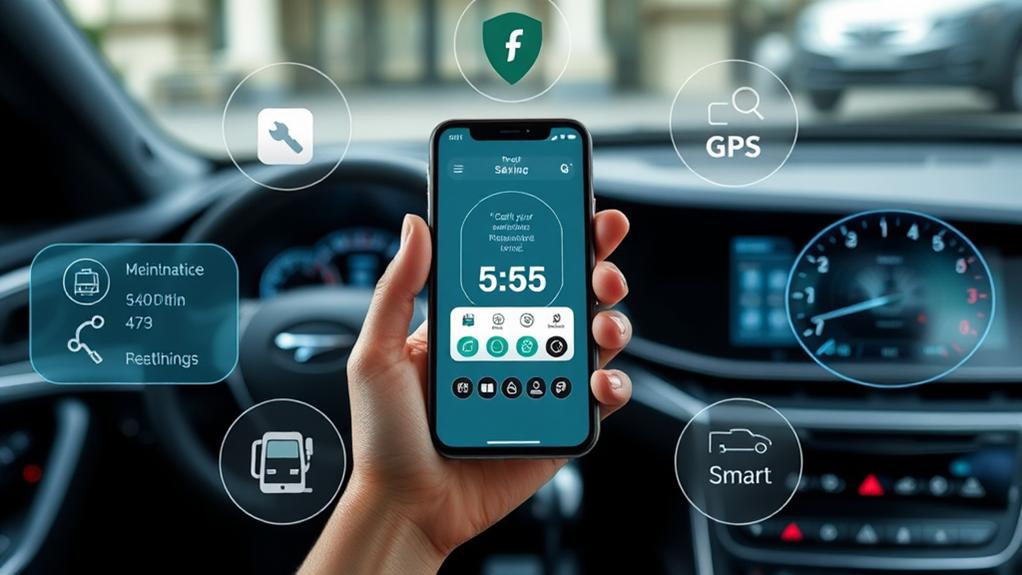
Maximizing your fuel efficiency doesn't stop with adjusting to your driving environment; incorporating technology into your routine can also lead to significant savings. Here are three ways you can utilize technology smartly:
- Fuel Tracking Apps: These apps analyze your consumption patterns, helping you track mileage and identify areas for improvement. By understanding your driving habits, you can save up to 10% on fuel costs.
- Vehicle Health Monitoring Apps: Stay ahead of maintenance needs with these apps. They alert you when your vehicle requires attention, ensuring peak performance and preventing costly breakdowns that can hinder fuel efficiency.
- GPS Technology: Use GPS to enhance your routes and avoid heavy traffic. This can save you up to 30% in fuel consumption by reducing unnecessary idling time and improving your acceleration at highway speeds.
Promote Fuel-Saving Behaviors
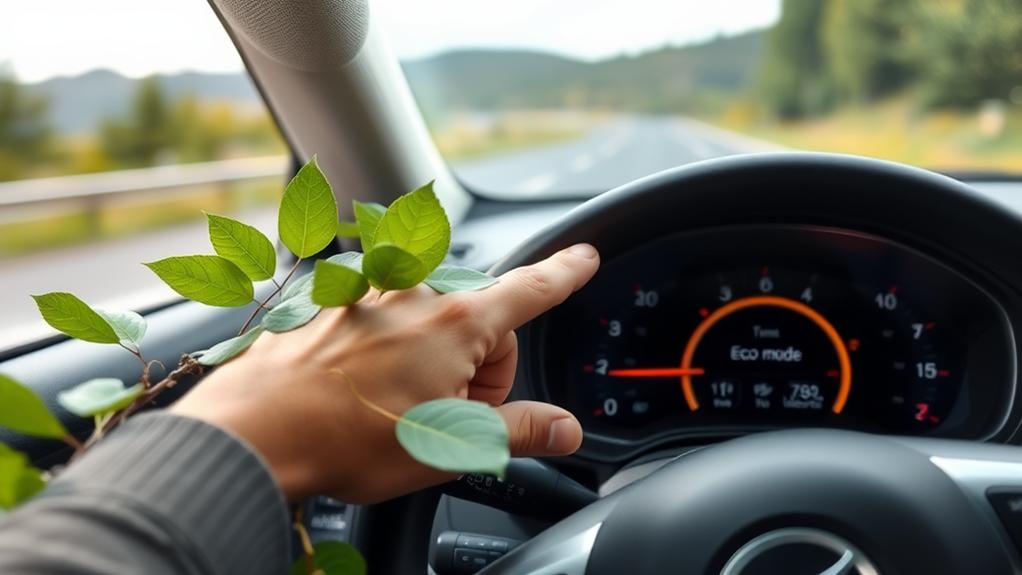
You can make a significant difference in your fuel efficiency by adopting fuel-saving behaviors that are easy to implement. Start by practicing smooth acceleration and braking; easing onto the gas pedal and braking gently can improve your fuel efficiency by up to 30%. This not only saves gas but also makes your ride more enjoyable.
Maintaining a steady speed, especially between 50-60 mph, is another key strategy. Fluctuating speeds can increase fuel consumption by as much as 20%, so use cruise control when possible on highways.
Avoid idling for more than 30 seconds; if you're stuck waiting, turn off your engine. You'll save more fuel than if you let it run.
Don't overlook proper tire inflation, either. Keeping your tires adequately inflated can enhance your fuel efficiency by 3-4%. Regularly check your tire pressure to guarantee peak performance.







